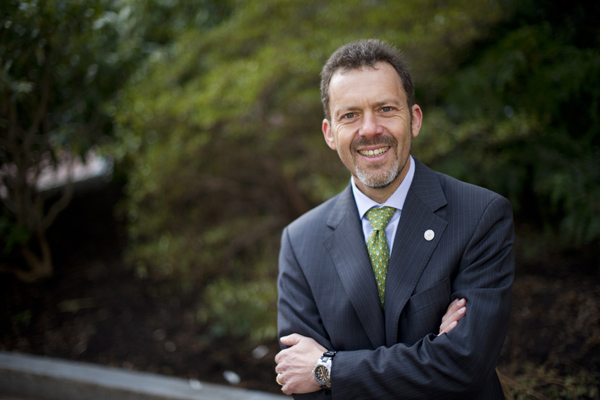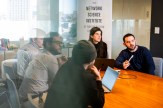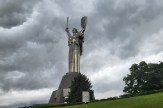From climate change comes opportunity to innovate

A cursory look at the Third National Climate Assessment released Tuesday by the National Climate Assessment and Development Advisory Committee yields a grim outlook. The authors state that climate change is already beginning to impact nearly every sector of the economy—and that’s not all: It’s already threatening human health and well being and adversely affecting our infrastructures, our water resources, our crops, our livestock, and our natural ecosystems. What’s more, planning efforts to adapt and mitigate the problem are facing serious limitations.
But Northeastern professor Matthias Ruth, who co-authored two chapters of the nearly-1,200 page report, isn’t pessimistic. As a leader in the emerging field of ecological economics, Ruth focuses his work on building bridges across sectors and disciplines to tackle the growing problem of climate change, especially in urban settings and he’s hopeful that this approach will bear fruit.
Some people will look at the report, he said, and panic about the costs of dealing with climate change. Others will worry about the costs if we don’t deal with it immediately. “And then there’s a third group, and that’s the one I’d love to see speak up,” said Ruth, who holds appointments in the School of Public Policy and Urban Affairs and the Department of Civil and Environmental Engineering. “They are the ones who don’t talk about the cost—they are the smart business people who say, ‘wow, there’s an opportunity here.’”
The chapters to which Ruth contributed focused on the impact of climate change on infrastructures, urban systems, and the northeastern United States. The report’s collaborative approach, he said, which focused on convening experts from a wide range of disciplines in industry, government, and academia, is exactly the kind of measure we must continue to employ.
“Everything’s interrelated—power, transportation, water—and they all have implications for public health,” Ruth said. “So one big take home message is that we need to begin to manage these as interrelated systems.” That message has come to the forefront in this report, the third since 1990, when congress passed the Global Change Research Act mandating regular climate assessments.
The other big message is that climate change is not a topic of the future, Ruth said, noting that “It’s already happening and every U.S. citizen is affected.” This is evident, he said, in the increased number of heat waves in northeastern cities such as Boston, in the deterioration of our infrastructures, and in changes to biodiversity in our ecosystems.
And business as usual won’t change the trend. “We draw on evermore depleted resources from all around the world to afford our lifestyles,” Ruth said. “We should be smarter than that.”
He said instead of putting up sea walls and other hard structures with materials from far away, we need to think about incorporating salt marshes and oyster beds along urban coastlines, as they can naturally help mitigate floods as storm surges increase. Instead of designing buildings for a climate of a hundred years ago, we need to think of alternatives to the flat black roofs that trap heat. Instead of thinking about our infrastructure systems as separate and contained, we need to imagine ways that water, energy, and transportation can work together to absorb the impacts of a changing climate.
Luckily, Ruth said, “This is the country where this happens. We pride ourselves on this entrepreneurial spirit of mobilizing resources and having the marketplace help support these decisions.” He envisions a world where we take all this disparate knowledge and create something new, a world where the traditional engineering methods work in unison with our local ecosystems—all supported by data and new innovations.
“With the world largely urbanized now, if we can figure out here how to make that transition to more sustainable urban living,” Ruth said, “I think we have a great business opportunity, but also a great humanitarian opportunity for other parts of the world.”





